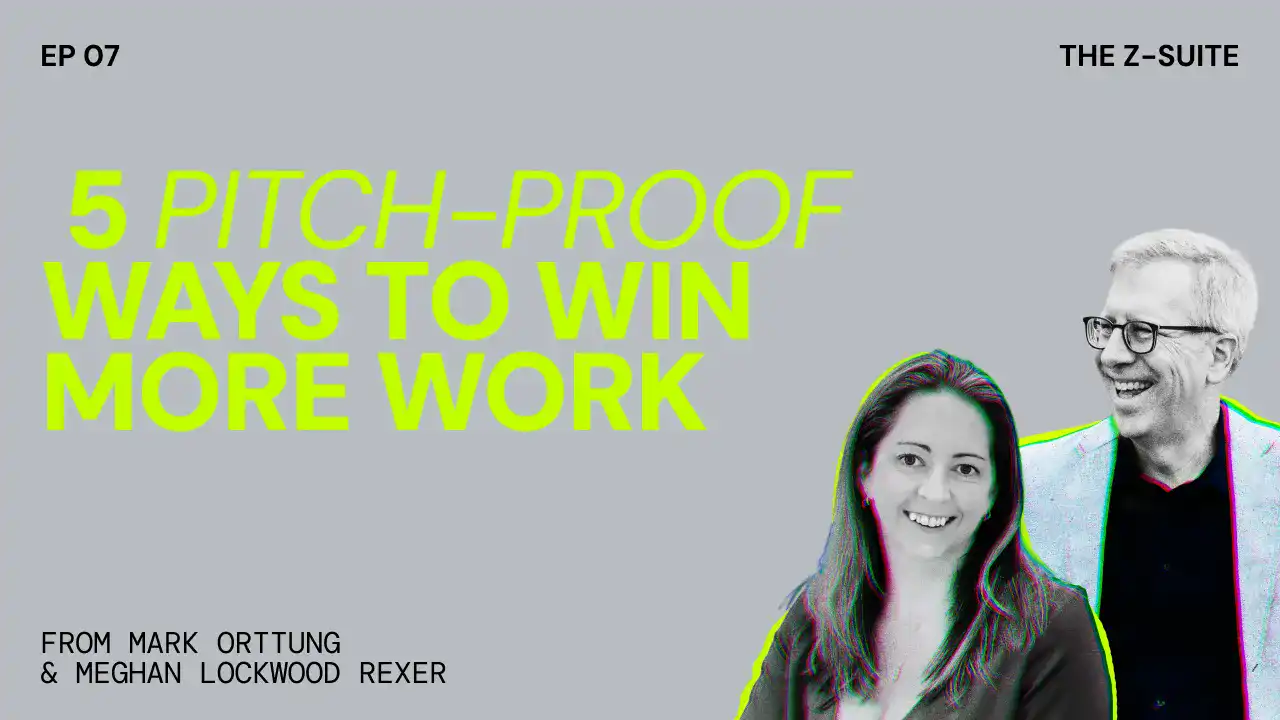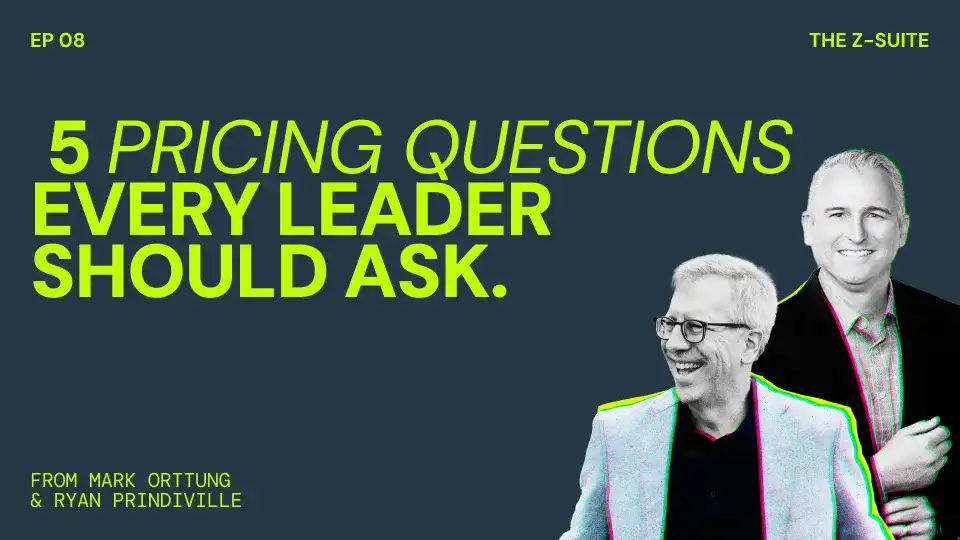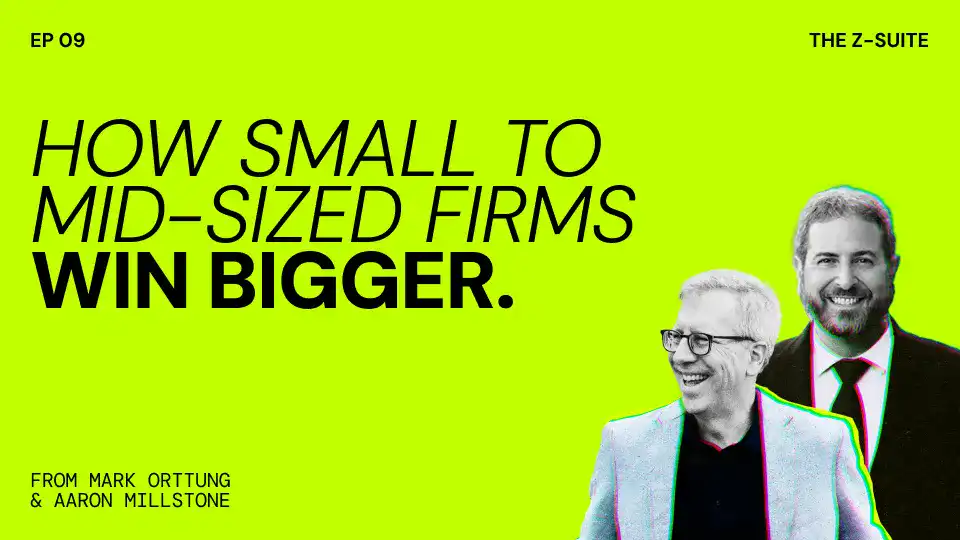5 Ways To Win More Work - From Consulting Leaders Who've Done It

It's never been easier to pump out a bland pitch - thanks ChatGPT. Unless your firm’s strategy is to be the cheapest offer on the table, here are five things your pitch will need to do to win in 2026, in order to win.
These are five field-tested strategies from two consulting leaders who've been winning work for decades, pulled straight from Mark Orttung’s live conversation in the Z Suite with CoreX Head of GTM, Meghan Lockwood-Rexer. Watch the full conversation below, or scroll down for their strategies.
1) Winning Proposals Turn Clarity Into Credibility
It’s tempting to answer every RFP that rolls in, and with AI that’s never been easier or faster. But as clients wade through larger and larger stacks of proposals, many of them jam-packed with AI slop, they’ll be even more ruthless about which ones get considered - and which ones go straight in the bin.
Win more work in 2026 by leading with a distinctive story about what you do better than your top three competitors. Avoid the temptation to be everything to everyone in every pitch. Instead, build credibility not just by stating what you do better than anyone else, but also by being explicit about what you don’t do.
“There’s so much noise, so you do have to be really credible where you are, because more than ever people will see through it. There’s a credibility to saying what you don’t do, as long as you’re telling an expansive enough story to support your team. It has to be small enough to be specific but big enough to hit your revenue goals, and that’s sometimes an interesting needle to thread.” - Meghan Lockwood Rexer
Shortcut to steal: Run your proposal through Meghan’s blandness test. If you could swap your company name with one of your competitors and nobody would notice, it’s time for a rewrite. The MECLABS Institute’s “4 Keys to a Compelling Value Proposition” is a great starting point.
2) Winning Proposals Build Authority For Humans And Bots
AI isn’t just making it faster to spin up proposals, it’s also making it faster than ever to review them. It’s not enough to sell your expertise to humans anymore. You have to sell it to the bots as well.
Win more work in 2026 by building credibility with both the AI-agent filter and the human on the other side. Make sure your private proposals and your publicly scrapable data tell the same story and reinforce the same areas of expertise.
“The same things that hurt your website’s SEO (high bounce rate, a lack of content about the thing you’re pitching for) will lower your AI authority ranking. If you’re pitching and you know you have to push it through an AI agent, make sure your site has branching content and other pieces of public information that the agent can search for, because otherwise you won’t be seen as a credible authority on whatever topic you’re trying to pitch.” - Meghan Lockwood Rexer
Shortcut to steal: Ask your favorite LLM to scan your firm’s publicly available data (website, PR, social media) and tell you what it thinks you’re most credible at. If you don’t like the answer, it’s time to shift your content strategy.
3) Winning Proposals Lead With Human Connection
AI is great at a lot of things, but deep empathy for an audience, understanding the context that shapes how decisions get made, and crafting a narrative that truly resonates are not among its strengths yet. Lean on it too heavily for proposal writing and you’ll sound like a sales pitch that hasn’t read the room.
Win more work in 2026 by cultivating a deeper understanding of whom you’re pitching to and what their team of humans needs most from your team of humans. Don’t just sell what your firm does. Sell what their company needs.
“A pitch shouldn’t feel like they’re going to trip, fall, and accidentally sign a check with us. We’re building a working relationship because what we do, and how we do it, aligns with what you do and how you’d like someone to approach an engagement. That’s what an AI model can’t do, make that human-to-human connection, and at the end of the day that’s what consulting is, people working with other people.” - Meghan Lockwood Rexer
Shortcut to steal: Try Meghan’s prompt as a starting point: “Imagine I’m pitching to the CEO plus two or three other personas, including the person I’m actually presenting to, about this strategic narrative. Based on their website, annual report, external postings, social media, and wider market conditions in their industry, what are their biggest business challenges that I should address?”
4) Winning Proposals Ask Before They Answer
It can feel like your firm needs to have all the answers in the very first meeting. There’s a simple approach many firms miss. No one knows more about the problem than the client. Sometimes simply asking about that problem is the most compelling way to start the pitch process.
Win more work in 2026 by ditching the slide deck for the initial meeting and spending that time talking with your future client about their problem, both the one in the RFP and the ones beneath it. You’ll be surprised how willing they are to talk. The insights you gain will be the winning edge when you finally sit down to write the proposal.
“Killing our 50-page slide deck was one of the scariest things we ever did, but it was so powerful. When we opened the process with a blank page and a simple question, ‘What’s keeping you up at night right now?’ we were miles ahead of the competition before we’d presented a single slide, and it built massive trust.” - Mark Orttung
Shortcut to steal: This one's an oldie but a goodie - use The 5 Whys to unearth the real problem to solve, then use that as the starting point for your proposal, not just the RFP.
5) Winning Proposals Treat Every Touchpoint As A Pitch
It won’t be the pitch deck that wins you the work. It will be the human-to-human trust and credibility you build along the way.
Win more work in 2026 by treating every interaction as an opportunity to build trust and credibility, every email, every phone call, every meeting. Make sure each touchpoint has a clear why, always include something valuable for them, and don’t forget the magic ingredient: confidence.
“You’re building a business relationship with people, and I don’t think any human likes to have a relationship with people who don’t think they ought to be in a relationship with them. There’s confidence in ‘Here’s why we think we’re great, and here’s why you should work with us.’ If it feels like an accident, it’s human nature to say, ‘You don’t even believe in yourself, so why should I?’” - Meghan Lockwood Rexer
Shortcut to steal: Meghan’s book recommendation, Influence: The Psychology of Persuasion by Robert Cialdini, goes deep into the psychology of why people say yes and the words that trigger it.
Burning down the pitch deck you've spent years building can feel daunting. Pick one new business opportunity this month to test it on. Open with the problem behind the RFP, tell a distinctive story about what you do best and what you do not do, and back it up with public proof that signals expertise to AI reviewers and buyers alike.
Do that consistently and you will ship proposals that feel confident, relevant, and hard to ignore. The firms that win in 2026 will not be the loudest. They will be the clearest, the most credible, and the most human.
Related Articles

Is Your Consulting Firm Worth Buying?
Most consulting firms grow by default. Fewer grow by design. That distinction matters more than many leaders realise, especially if the goal is to build a firm that attracts a strong revenue multiple. In the first episode of Season two of The Projectworks Podcast, Mark Orttung and Dominique Rennell introduced the Growth Maturity Model they are developing to help consulting leaders answer a hard but necessary question: is your firm actually built in a way someone else would want to buy it?

Five pricing questions every consulting leader should ask in 2026
If you signed a big client tomorrow at your current rates, would you be happy to live with that pricing for the next three years? Most consulting leaders I speak to quietly admit the answer is no. Wage costs have jumped, client expectations have shifted, and yet rate cards still reflect a world from two or three years ago.
